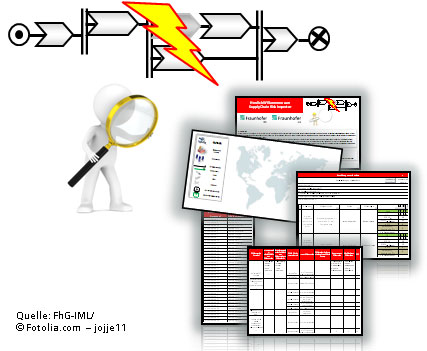Why do deviations from the schedule or disturbances in supply chains occur and how can they be avoided? How can costs and efforts for exception handling and special transports be reduced?
Every procedure in the supply chain is exposed to risks which can cause disturbances. These can go so far that business processes cannot be performed as planned anymore. The result can be higher efforts, additional costs and a decline in customer satisfaction. Suitable actions for risk reduction can only be made if the cause and consequences of risks are understood and evaluated in the right way.
The Fraunhofer IML developed the industry-tested “Supply Chain Risk Inspector”, which is based on a systematical approach. The tool supports companies in managing their risks in a conscious and targeted way and regulates them proactively or reactively. It is the goal to design business processes efficiently and robust.
The operating principle of the Supply Chain Risk Inspector is based on an approach that was developed in cooperation with the Fraunhofer IPA and can be structured in four phases:
- Phase 1: Risk identification
Identification of risky supply chains
Evaluation of individual supply chain parts with regard to resilience, strain and coordination effort
- Phase 2: Risk evaluation
Evaluation of identified risks with the aid of a modified failure mode and effects analysis (FMEA)
Aggregation of risk probability and risk consequences to a risk priority index
- Phase 3: Risk stabilization
Development of measures for risk stabilization
Evaluation of effects of different stabilization measures with the aid of the risk priority index
- Phase 4: Cost and benefit distribution
Identification of all supply chain partners that are needed for the risk stabilization
Allocation of all expenditures and beneficial effects to all involved supply chain partners
 Fraunhofer Institute for Material Flow and Logistics IML
Fraunhofer Institute for Material Flow and Logistics IML